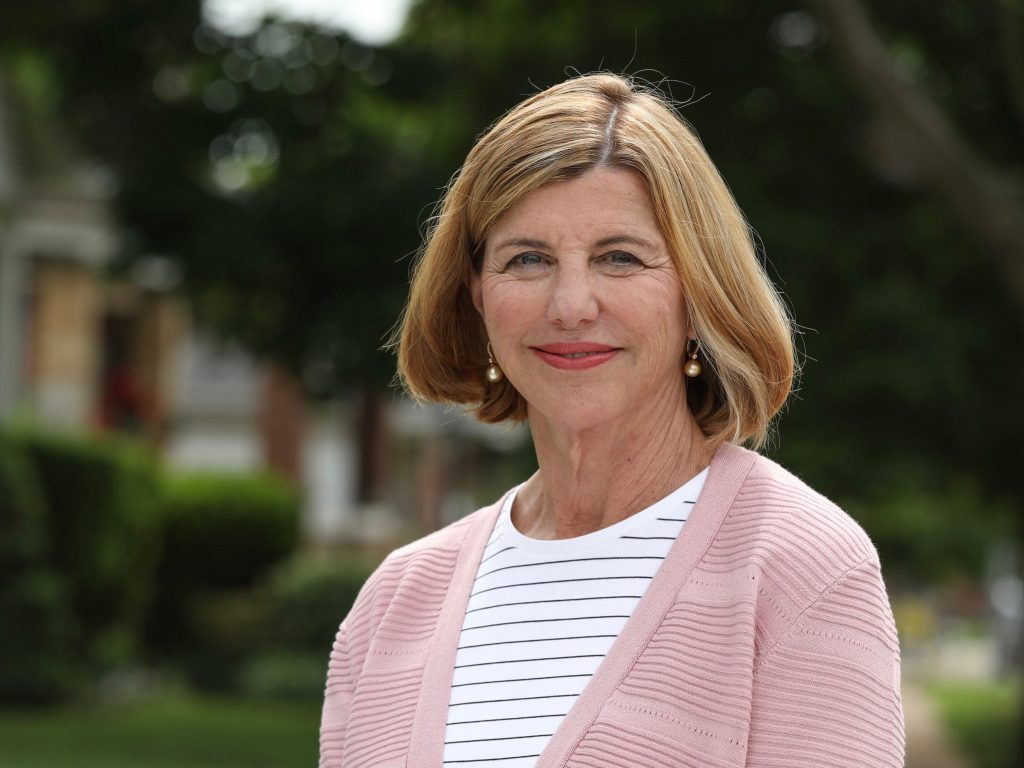- A Democratic US Senate candidate in Missouri has pledged to "stand up" to health insurers.
- But the candidate, Trudy Busch Valentine, holds stock in CVS Health, Humana, and UnitedHealth Group.
- She has pledged to put her investments in a blind trust if elected.
In her bid to represent Missouri in the US Senate, Democrat Trudy Busch Valentine has pledged to "stand up insurance companies" on healthcare reform.
Yet the first-time political candidate holds stocks in large health insurance companies, according to a personal financial disclosure Valentine filed with the US Senate. They include investments in Humana; UnitedHealth Group, the world's largest insurer; and CVS Health, the parent company of Aetna.
Taken together, the shares are valued between $768,008 and $1.7 million, according to an Insider analysis of the filings.
Valentine's disclosure also indicates that, in 2021, she earned between $237,908 and $2.1 million in income from dividends and capital gains from the health insurance investments.
Candidate reporting rules only require politicians to report their values of their stock holdings, dividends, and capital gains in broad ranges.
Valentine is a former nurse and also a multi-millionaire. Her family owned a majority stake in Anheuser-Busch until 2008, when InBev bought the alcohol retailer for $52 billion.
She holds stock in numerous other corporations, including tech giants Apple, Amazon, and Google, apparel company Nike, and Regeneron Pharmaceuticals, which made a COVID-19 treatment.
She and and her husband have a net worth between $69.4 million and $219.4 million, according to her financial disclosure. If elected, she'd be one of the wealthiest members of Congress. She has pledged not to take a Senate salary if she wins the race.
"Trudy has been very clear that she can't be bought, that she is running for public office as another form of service, and that expanding quality, affordable healthcare is one of her top priorities," Valentine campaign spokeswoman Elizabeth Markowitz told Insider in response to an inquiry about the disclosure.
Valentine has said that if elected then she would place the assets of she and her husband, John Fries, into a blind trust, which is a formal arrangement, requiring congressional approval, in which a lawmaker officially transfers management of their financial assets to an independent trustee.
Markowitz said the arrangement would help Missouri voters "trust that she is voting in their best interests" and that Valentine would start the process "immediately" after being elected.
Dylan Hedtler-Gaudette, government affairs manager at the nonpartisan Project on Government Oversight, said the investments could "raise questions about how that person is going to operate as a member of Congress in terms of ethics and conflicts of interests."
"The cleanest thing to do for anyone who is running for office, as a way to remove doubts about their decisions, is to clean up their portfolios as much as possible," such as investing only in index funds or completing the blind trust process before running for office.
Even with a blind trust, he said, there can still be conflicts of interest because politicians already know which corporate stocks they hold.
Congressional guidance says blind trusts provide the "most comprehensive approach" to avoiding "potential conflicts of interest or the appearance of such conflicts," but they can be expensive and time-consuming to establish, making them only accessible to wealthy lawmakers.

Crowded race in Missouri
Valentine is one of the frontrunners in an 11-person race, alongside Marine veteran Lucas Kunce and businessman Spencer Toder. They'll face off in the August 2 primary for the seat that is being vacated by Republican Sen. Roy Blunt, who is retiring.
The winner will likely face one of three Republicans: former Gov. Eric Greitens, Rep. Vicky Hartzler, or Missouri Attorney General Eric Schmitt. Rep. Billy Long and several other lesser-known candidates are also running.
Valentine has said that watching her younger sister receive care after a severe spinal cord injury inspired her to go into the healthcare field. She later became a volunteer hospice nurse after her husband died of cancer in 2002. Two decades later, her son died from an opioid overdose.
She has pledged not to take funds from corporate political action committees.
Insider's "Conflicted Congress" investigation published in December found dozens of lawmakers whose personal stock trades are discordant with their public responsibilities, such as members who craft anti-tobacco policy but invest in tobacco giants and others who receive plaudits from environmental groups for crafting policy aimed at combating the climate crisis — yet invest in fossil fuel companies.
"Conflicted Congress" also found numerous examples of conflicts of interest among federal lawmakers, both Democrats and Republicans.
The 2012 federal Stop Trading on Congressional Knowledge Act, or STOCK Act, allows members of Congress and candidates for office to trade stocks so long as they quickly and publicly disclose the trades.
But in recent months Congress has been debating whether to make the rules more strict — or to ban congressional stock trading altogether.
Valentine has pledged to co-sponsor a ban for lawmakers and their immediate families.
Her campaign said her stocks are managed by investment managers who have "complete discretion" over her stock purchases, adding that she does not "have daily oversight of those decisions."
Valentine favors a 'public option'
Valentine said during a candidate forum this month that she doesn't support a healthcare proposal known as "Medicare for All," which would abolish nearly all private health insurance in favor of placing everyone living in the US onto a government plan.
At least eight other Senate candidates in Missouri said they supported the Medicare for All Act, which independent Sen. Bernie Sanders of Vermont has championed.
Instead, Valentine favors an approach also endorsed by President Joe Biden during his White House campaign. Often called a "public option," the plan would create a government insurance option similar to Medicare that people could opt to have instead of private insurance.
Health insurers oppose both a public option and the Medicare for All Act, instead favoring more funding toward Obamacare, formally known as the Affordable Care Acrt.
"Trudy supports universal access to quality, affordable healthcare," Markowitz said. "She believes that everyone should be able to afford to see a doctor. Trudy is open to a variety of proposals to get America to universal coverage."

